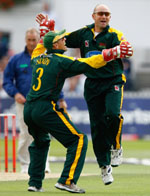Here’s a simple way to have a better season
Its human nature to focus on the negative side of life and take the positives for granted. Cricket is no different. I know I've often got frustrated with some of my performances even when I did most things right.
An effective strategy I have found as both a coach and cricketer is to keep a performance file for the season.
Readers Question: Do you sledge?
What with Paul Nixon taking English sledging to a new level and a big jump in harrowdrive subscribers this week I thought it was the perfect time to ask you a question.
Do you sledge?
We certainly do at my club, although it's more subtle than the in-your-face insult stuff of the International game. Here are some ways I like to do it:
9 Ways to be ready for the new cricket season
Lighter nights, warmer days and flowers blooming everywhere.
Spring has arrived around these parts and that means pre-season training has begun in earnest.
How can you make the most of this critical period in your preparation?
How to practice with a bowling machine
Having a bowling machine to practice with is a mixed blessing. Yes. It's way more accurate than any bowler can hope to be, but it also changes the way you bat.
Sport boffins recently tested the difference between batting against bowlers and machines, finding the batsmen naturally adjust their backlift when facing the machine (pdf). That means you need to be cautious when practising with the Bola.
Developing Unconcious Reaction
The most important question a cricketer can ask
As you can imagine, I get contacted a lot by cricketers asking all kinds of questions about their game.
I love it, so don't stop but it got me to wondering about some of the bigger questions we often forget to ask ourselves as players.
I think the number one question any player can ask is only 4 words but it can reveal so much:
When to retire from club cricket
Retirement from any recreational sport is a highly individual matter and not just for older players.
Unlike professionals, retirement for many club players is more a matter of life taking over: Family, work and other interests all cause early 'retirements' every year. We have all had games where we feel the last thing we want to do is waste our weekends dropping catches and getting belted all round the park!
How to be relaxed and confident at the crease
Imagine having a button you can press on the cricket pitch that shuts your stress down, while leaving you in full control.
In fact, you can have one of these buttons.
It's called an 'anchor' and the idea is based entirely on the most famous successful psychological experiment in history.
Pavlov's Dog
Are you a Boycott or a Botham?
Is it true that cricketers are either a Boycott or a Botham?
It's often said to be the case that you are either cautious in nature and play safe (Boycott) or flamboyant and risky (Botham).
In fact, I have found that good players can operate using both philosophies depending on the game situation. Even Boycott could attack when he felt it needed (which wasn't very often).
Psychology is just good cricket thinking
There is no one in the UK cricket scene who knows more about sport psychology than Jeremy Snape.
He rightly points out that if 80% of cricket is in the head, why do we only spend 5% of the time working on our mental game?
 But the England international, Master in Sports Psychology, and captain of Leicestershire CCC isn't into airy-fairy discussions about your relationship with your mother. Running his own company, Sporting Edge Solutions, he leaves the word 'psychology' with all it's negative connotations at the door and trains top class players in the practical application of performance thinking.
But the England international, Master in Sports Psychology, and captain of Leicestershire CCC isn't into airy-fairy discussions about your relationship with your mother. Running his own company, Sporting Edge Solutions, he leaves the word 'psychology' with all it's negative connotations at the door and trains top class players in the practical application of performance thinking.
Ignore context to reduce pressure
If anyone knew about pressure in sport it was 5 times Olympic Gold medalist Steve Redgrave.
His method for dealing with the massive pressures of his sport work just as effectively for cricketers too.
He knew it's the context that is the problem, not the task.
The example Steve often cites is walking across a plank of wood. If the plank were a foot off the ground, most people would dash across it no problem.

